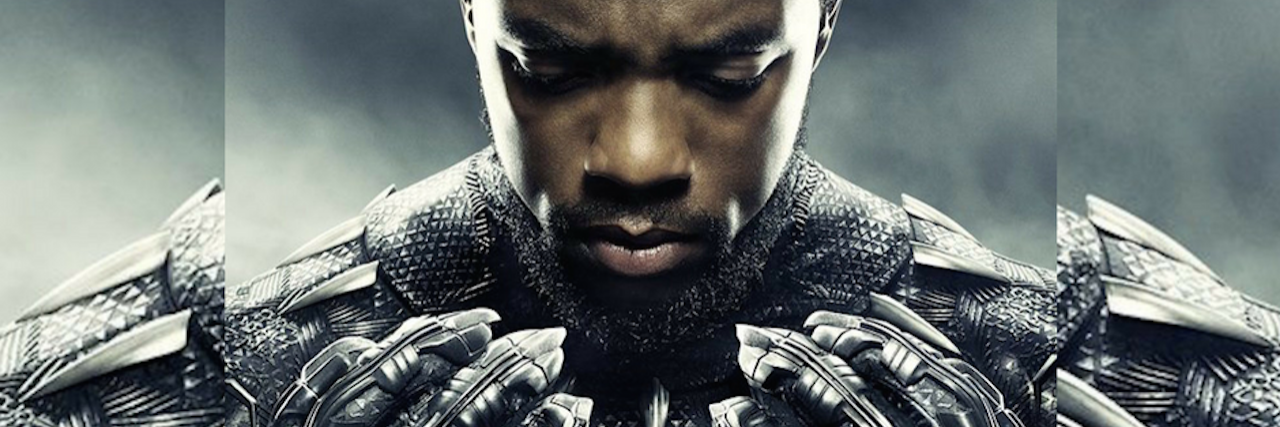What 'Black Panther' Taught Me About My Childhood Trauma
Editor's Note
Editor’s Note: The following post contains spoilers for “Black Panther.”
When I was 10, I tried out for the local synchronized swim club, but I didn’t make it, probably because I couldn’t seem to keep my head under water. The coach took my Mum aside and we left. I never tried again. I learned throughout my childhood that if I failed at something, it isn’t meant for me. It’s for other people. If I can’t be the best right away, then I shouldn’t bother. Better to put my attention elsewhere. Now I’m learning those lessons from my childhood aren’t true or positive. Failure is a necessary part of learning. As I watched “Black Panther” last weekend, I was inspired by how the characters used failure to learn and make decisions. King T’Challa and M’Baku in particular are able to use their failures to ultimately secure victory.
Early on in the movie, as King T’Challa prepares to go into his first battle, he says, “I can handle this alone… I never freeze.” But he does freeze, and he needs some help. Even a superhero can’t fight all of his battles alone. I face many battles alone: anxiety walking into the mall or the doctor’s office, grief over lost pieces of my childhood and reliving traumatic memories. But I don’t need to face everything alone. I can ask for support, so as I practice doing hard things, I have someone to lean on. I can invite a friend to come to the mall or I can practice role playing with my therapist. Just because I can handle a task alone doesn’t mean I have to. Sharing with a trusted friend opens me up to their support and changes my thoughts to allow myself to receive help.
Early on his his reign, King T’Challa’s father gives him similar advice: “You’re going to struggle so you need to surround yourself with people you can trust.” When I failed as a child, I didn’t have anyone telling me to move on and persevere and learn from my mistake. But now I can be that person to myself and to my family. Because few failures have life-altering consequences. Usually it just means I wasn’t perfect or didn’t win this time. One of King T’Challa’s “friends” W’Kabi tells him, “I thought it would be different, but it’s more of the same.” This is not a person the king can rely on for support, so he doesn’t. He surrounds himself with allies but he is also open to new and different perspectives.
In the battle for the throne, King T’Challa is down and looks ready to give up. Then his mother reminds him who he is and he yells it out like a battle cry. Announcing who he is brings life back into his fight. Who am I? Sometimes I forget who I am and what I have survived. You and I have survived 100 percent of our difficult days so far. And many of them as a child! That’s pretty darn awesome of us! The next time I’m lying in bed feeling that there is no point in getting up, I’m going to tell myself who I am and what I believe in until I get myself out of bed.
Now that I’ve surrounded myself with people I can trust, it’s time to stop taking responsibility for the actions of others. King T’Challa is told, “you can’t let your father’s mistakes define who you are,” which means so much more to me than seeing past an impulsive mistake made by a parent. It means what others did and said to me as a child was not about me, and it wasn’t my fault. It means my parents and everyone else are human, and their behavior is the result of their genetics and their history. It means moving past my childhood trauma to figure out who am I, what I like and who I want to spend time with. It goes along with King T’Challa being told, “you get to decide what kind of king you want to be.” In this line, he is given the freedom to carve a new path rather than continue on the ways of his ancestors. He finds a balance between tradition and change. And I also get to define who I want to be, as a unique individual whose trauma history is only one part of who I am.
King T’Challa says, “we let fear stop us from doing what is right.” How many times I’ve let fear take over! I remember being asked on a date as a teenager and fear kept me home in my room. I couldn’t find a way to even pick up the phone to cancel. Rather than exercise healthy boundaries, I ran away and hid and avoided discussion. I hurt his feelings and lost an opportunity to learn how to say “no” with kindness.
The biggest lesson I learned from “Black Panther” came not from King T’Challa but from M’Baku. After public defeat and humiliation, he puts aside his own pride to help King T’Challa. He chooses not to seek revenge. He chooses not to hide. And in watching him do this, I learned overcoming failure is about accepting it happened and doing what is right, whether it’s an apology, offering help or learning how to do better next time. M’Baku didn’t hide in his bed and try to forget he failed (something I have done many times!). He sat in his throne and led his people in doing the right thing. I can’t think of a better way to be a role model than to show others that doing the right thing is more important than hiding from my own failures.
Image via “Black Panther” Facebook page

